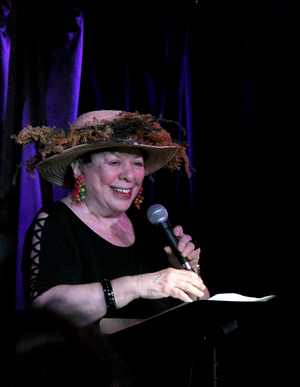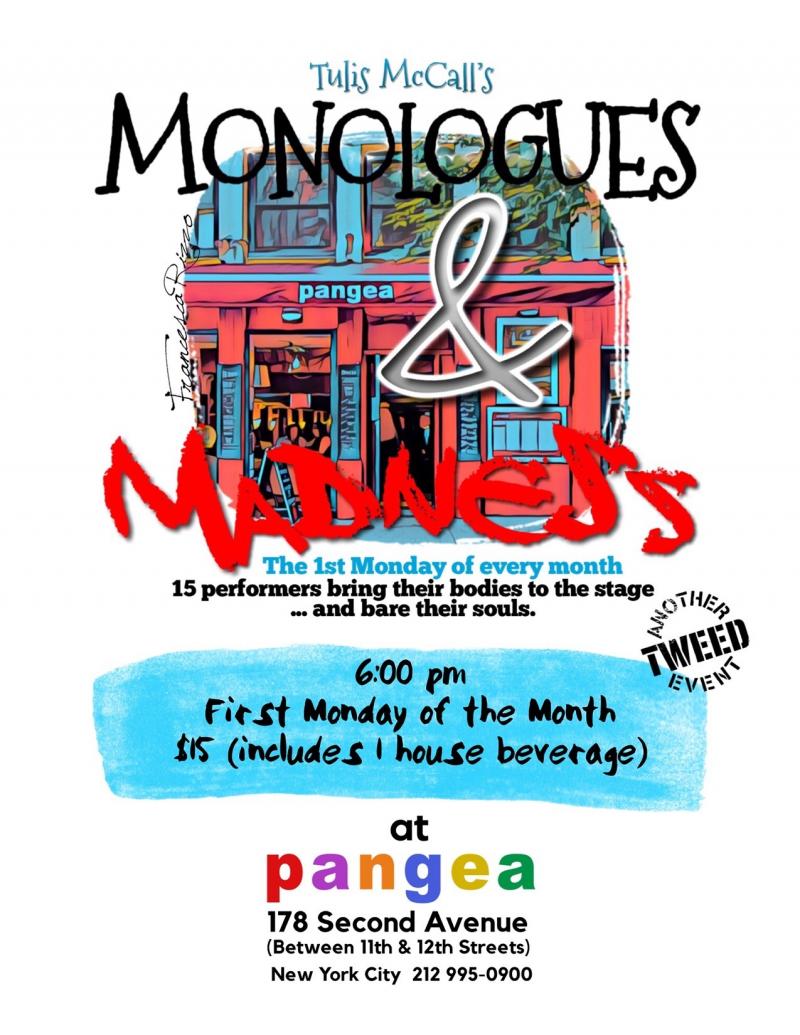Review: MONOLOGUES AND MADNESS Brings Artists Together at Pangea

Regularly I frequent an acting workshop given by The Shakespeare Forum, not that I am an actor or know a blame thing about Shakespeare. I just like to go and watch the artists create. I love actors and watching them work and when I go to The Shakespeare Forum's open workshop I can spend a Tuesday night observing craftspeople as they ply their craft for a mere five dollar donation - how great is that? It's one of my favorite things to do. Once or twice I even got up and did a little acting - it wasn't Shakespeare, of course, but The Shakespeare Forum doesn't restrict what is performed at their workshops. It's two hours around New York City artists creating, which beats staying at home any night of the week.
So imagine my delight when I was scanning the cabaret calendar of the downtown eatery Pangea and I saw the title "Tulis McCall's Monologues and Madness". Intensely curious and wildly excited, immediately I reached out to Pangea to ask for a press seat to the show; and what I found there was a theater artisan's heaven.
Monologues and Madness is a twelve-year long institution started by Tulis McCall as an evening at Cornelia Street Cafe where, each night, a person could find a different talent on display, from jazz to spoken word, from singing to belly dancing. A regular at the eatery, Tulis found herself offered a spot one night a week to present an entertainment of any nature she desired to create. Her first efforts were self-penned plays that few people attended - some nights the cast of actors outnumbered the audience members. Not to be deterred, and with the curator of art at Cornelia Street Cafe continuing to invite Tulis back, this author of one-woman shows had an idea: the play thing not selling well enough, she shifted gears and decided to focus on monologues, thinking the shorter artform might be more of a draw. One e-blast later, and Cornelia Street Cafe had a night in 2007 when 8 people showed up - It wasn't enough, but it's enough for people to go 'Ok when are you gonna do it again?' Monologues and Madness had had its' timid, but auspicious debut in New York. The next step in the success game was the same as it has always been: Word of Mouth.
"Then people tell each other cause it's really nice for people to hear what they've been writing, in front of a group. You know right away whether it's working or it isn't. It's a great testing ground, which is my intention. And we've had a few one-person shows come out of what people have brought in."
Every monologue seen at the monthly event is an original monologue being performed as the writer is in the process of creation. Sometimes the authors themselves will present their own works but, in the event that a writer would rather sit and listen to their words spoken, acted out loud, Tulis is happy to coordinate a match between monologue and actor, via the Monologues and Madness website. "I do if somebody wants me to - not too many people do, but I have done that. I've asked other people to - Dan Lauria came in one time and read a couple of my monologues. So, people have had other artists read their work, it's totally up to them. I'm always angling for character monologues because they don't do it so much in auditions anymore, where you bring in your own stuff. It's for people who want to write a play."
The process of getting your work performed at Monologues and Madness is a simple one. An author visits the Monologues and Madness website and contacts Tulis for a time slot. Once confirmed, each writer is requested to supply their audience, making necessary the act of inviting and confirming two guests. Industry guests are encouraged, but only when an author is ready to take that step. On the evening of, everyone piles into a room, orders drinks or food or both, sits back and listens as, one by one, the artists take the four minutes allotted to them and present their work - monologues only, not poems, short stories or stream of consciousness. And there is no pressure to memorize the monologue - reading your work is the intention of the evening -- and reading your monologue insures staying inside of the time limit because there are no pesky delays when you forget your next line. "They're coming and trying it out, and they know they're among friends. And if you can't make your point in four minutes, then you're in trouble."
The series is extremely popular, garnering enough regulars that, on the night this writer attended, the mood of the room at Pangea was that of a gang of friends hanging out. There was much socializing beforehand, guests arriving late could find that their friend had saved them a seat, one performer could even be seen stretching and warming up for his time on stage. Then, casually, Tulis took the stage and talked to everyone briefly, welcoming them to the festivities and describing it as if a person walking through a theater opened a door and peeked in and someone was rehearsing, you could watch because (and at this point everyone in the room chimed in) "We JUST don't CARE." Yep. This is definitely a fun, casual, relaxed group of artists who are serious about one thing: the monologue.
On the night I attended there were humorous monologues, disturbing ones, one that was extremely topical on political matters, there was irreverence and social conscious, and there was a wonderful moment when a woman entering late took a spot right at the foot of the stage, wearing an enormous straw hat covered in flowers. The next performer up at bat looked down at her and said "I'm glad to see Taffy brought her garden tonight," filling the room with friendly laughter. When it came time for Taffy Jaffe to perform her incredibly funny monologue, she paused before starting to say: "I'm so happy to be here with my monologues and madness family."
Family is very important in the arts - no artist wants to be alone, they need community. Tulis informs that there is a core Monologues and Madness group of about 20, but that there are new people coming in all the time, keeping it fresh. The core group themselves focus on bringing their friends to expand the reach, and like that old shampoo commercial, they told two friends, and they told two friends, and they told two friends... and what has come of a simple idea born at the Cornelia Street Cafe has turned into an artists' community where writers and actors can gather once a month, have a drink, have a chat and a laugh, and then get down to the happy business of creation.
Monologues and Madness takes place at Pangea on the first Monday of every month (Please check calendar for changes: Pangea Website
To learn more about Monologues and Madness visit their Website
To learn more about The Shakespeare Forum visit their Website


Add Your Comment
Videos
